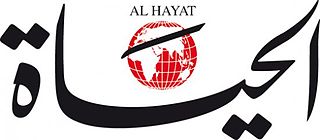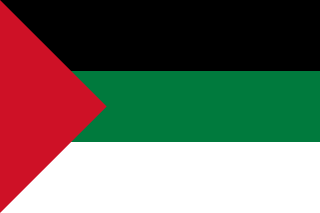Related Research Articles

The history of Saudi Arabia as a nation state began with the emergence of the Al Saud dynasty in central Arabia in 1727 and the subsequent establishment of the Emirate of Diriyah. Pre-Islamic Arabia, the territory that constitutes modern Saudi Arabia, was the site of several ancient cultures and civilizations; the prehistory of Saudi Arabia shows some of the earliest traces of human activity in the world.

The Arab world, formally the Arab homeland, also known as the Arab nation, the Arabsphere, or the Arab states, refers to a vast group of countries, mainly located in Western Asia and Northern Africa. While the majority of people in Arab world are ethnically Arab, there are also significant populations of other ethnic groups such as Berbers, Kurds, Somalis and Nubians, among other groups. Arabic is used as the lingua franca throughout the Arab world.

Pan-Islamism is a political movement advocating the unity of Muslims under one Islamic country or state – often a caliphate – or an international organization with Islamic principles. Pan-Islamism was launched in Turkey at the end of the 19th century by Sultan Abdul-Hamid II for the purpose of combating the process of westernization and fostering the unification of Islam.
Al-Manār, was an Islamic magazine, written in Arabic, and was founded, published and edited by Rashid Rida from 1898 until his death in 1935 in Cairo, Egypt. The magazine championed the superiority of Islamic religious system over other ideologies and was noteworthy for its campaigns for the restoration of a pan-Islamic Caliphate.

Al-Hayat was a London-based, pan-Arab newspaper owned by Saudi Prince Khalid bin Sultan, that had a circulation estimated over 200,000. It was the newspaper of record for the Arab diaspora and the preferred venue for liberal intellectuals who wish to express themselves to a large public. Founded in 1946, the paper closed in March 2020 after years of financial problems.

The Washington Report on Middle East Affairs magazine, published eight times per year, focuses on "news and analysis from and about the Middle East and U.S. policy in that region". The New York Times has characterized it as "critical of United States policies in the Middle East". In 2005, USA Today called it "a non-partisan publication that has been critical of Bush's policies". Representatives of pro-Israel organizations have criticized the Washington Report on Middle East Affairs as being aligned with the Arab lobby and as "anti-Israel".
Islam and modernity is a topic of discussion in contemporary sociology of religion. The history of Islam chronicles different interpretations and approaches. Modernity is a complex and multidimensional phenomenon rather than a unified and coherent one. It has historically had different schools of thought moving in many directions.

Mohammed Mahbub Husain is a British author and academic. He is also a professor in the Walsh School of Foreign Service in Georgetown University. As a political advisor he has worked with leaders and governments across the world. He has held senior fellowships at think tanks in London and New York, including at the Council on Foreign Relations (CFR) at the height of the Arab uprisings (2010–2015). While at CFR, his policy innovation memo led to the US-led creation of a Geneva-based global fund to help counter terrorism. He is also a member of the editorial board of the Studies in Conflict & Terrorism, a monthly peer-reviewed academic journal covering research on terrorism and insurgency.
Yasser Khalil is an Egyptian journalist.
The Arab Cold War was a period of political rivalry in the Arab world from the early 1950s to the late 1970s as part of the broader Cold War. The generally accepted beginning of the Arab Cold War was the Egyptian revolution of 1952, which ultimately led to Gamal Abdel Nasser becoming President of Egypt in 1956. Thereafter, newly established Arab republics defined by revolutionary secular nationalism, and largely drawing inspiration from Nasser's Egypt, were engaged in political rivalries of varying degrees of ferocity with conservative traditionalist Arab monarchies, led chiefly by Saudi Arabia. The approximate end point of this period of internecine rivalry and conflict is generally viewed as being the 1979 Iranian Revolution, which culminated in the installation of Ayatollah Ruhollah Khomeini as the leader of Iran's theocratic government. Thereafter, the bitterness of intra-Arab strife was eclipsed by a new era of Arab-Iranian tensions.

Sayidaty is a weekly Arabic and a monthly English women's magazine published in both Riyadh and Beirut and distributed throughout the Middle East, North Africa, Europe and America.
In Bahrain, there are seven free-to-air television channels, four of which are privately owned. The country's public service broadcaster, Bahrain Radio and Television Corporation (BRTC), broadcasts over five terrestrial TV networks, including the popular Channel 44. Around 35–40% of its output is locally produced. Free satellite is the dominant television platform, reaching 51% of Bahraini households. The country has a relatively high pay-TV penetration, estimated at 51% in 2011. There are three main pay-TV operators: OSN, ART and Al Jazeera Sports. The government-controlled Information Affairs Authority directly controls BRTC and indirectly controls the country's other television networks.

Arab nationalism is a nationalist ideology that asserts the belief that the Arabs are a nation and it also promotes the unity of Arab people, celebrating the glories of Arab civilization, the language and literature of the Arabs, and calling for the rejuvenation and political unification of the Arab world. Its central premise is that the people of the Arab world, from the Atlantic Ocean to the Indian Ocean, constitute one nation bound together by common ethnicity, language, culture, history, identity, geography, and politics. One of the primary goals of Arab nationalism is the end of Western influence in the Arab world, seen as a "nemesis" of Arab strength, and the removal of those Arab governments considered to be dependent upon Western power. It rose to prominence with the weakening and defeat of the Ottoman Empire in the early 20th century and declined after the defeat of the Arab armies in the Six-Day War.
Al Fatat was a women's magazine published in Alexandria, Egypt. The magazine was the first Arab women's magazine and was one of the earliest publications in the country. It was published from 1892 to 1894. Al Fatat is the forerunner of the women's magazines in the Arab countries.
Anis Al-Jalis was a monthly women's magazine published in Alexandria from 1898 to 1907. Its founder and editor was Alexandra Avierino, a British and Greek female writer who was born in Lebanon and spent most of her career life in Egypt. Though some contributors were women, including Esther Moyal, most were men. The magazine mostly covered articles on home economics, child-rearing practices, fashion and home decoration. At the initial phase Anis Al-Jalis targeted bourgeois women, but later it addressed all society categories including rural women, creating sections for them.

Palestinian nationalism is the national movement of the Palestinian people that espouses self-determination and sovereignty over the region of Palestine. Originally formed in opposition to Zionism, Palestinian nationalism later internationalized and attached itself to other ideologies; it has thus rejected the occupation of the Palestinian territories by the government of Israel since the 1967 Six-Day War. Palestinian nationalists often drawn upon broader political traditions in their ideology, examples being Arab socialism and ethnic nationalism in the context of Muslim religious nationalism. Related beliefs have shaped the government of Palestine and continue to do so.

Arab identity is the objective or subjective state of perceiving oneself as an Arab and as relating to being Arab. Like other cultural identities, it relies on a common culture, a traditional lineage, the common land in history, shared experiences including underlying conflicts and confrontations. These commonalities are regional and in historical contexts, tribal. Arab identity is defined independently of religious identity, and pre-dates the spread of Islam and before spread of Judaism and Christianity, with historically attested Arab Muslim tribes and Arab Christian tribes and Arab Jewish tribes. Arabs are a diverse group in terms of religious affiliations and practices. Most Arabs are Muslim, with a minority adhering to other faiths, largely Christianity, but also Druze and Baháʼí.

Raghid Kazem El-Solh was a Lebanese writer and researcher in international and Arab regional relations as well as democracy issues. He published several books about international relations, the Arab region and democracy. He was a regular contributor to several publications including the London-based pan-Arab Al-Hayat newspaper, and was a regular lecturer, political commentator and a consultant for the UN and other organizations.
Al Adab was an Arabic avant-garde existentialist literary print magazine published in Beirut, Lebanon, in the period 1953–2012. It was restarted in 2015 as an online-only publication. Encyclopædia Britannica describes it as one of the leading publications founded in the Arab countries in the latter half of the 20th century. Although the magazine was headquartered in Beirut, it was distributed all over the Arabic-speaking regions.
Al Fath was a weekly political magazine which existed between 1926 and 1948 in Cairo, Egypt. The magazine is known for its cofounder and editor Muhib Al Din Al Khatib and for its role in introducing Hasan Al Banna, founder of the Muslim Brotherhood, to the Egyptian political life. It called itself as the mirror of the Islamic world.
References
- Gallagher, Rachael. "The Arab takes the politics out of Middle East" Press Gazette . 11 February 2008.
- "New pan-Arab magazine launched from London". Arab Media Watch. 7 February 2008.